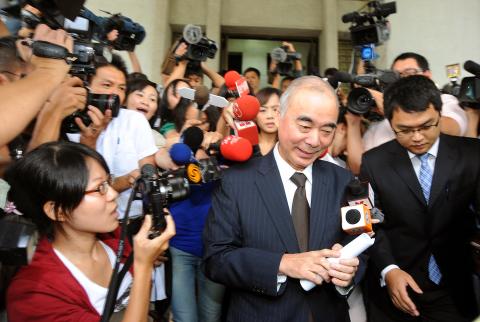The Ministry of Foreign Affairs (MOFA) yesterday recalled Taiwan’s representative to Japan in response to Japan’s decision to nationalize some of the disputed Diaoyutai Islands (釣魚台).
Minister of Foreign Affairs Timothy Yang (楊進添) said at a press conference that the ministry filed a strong protest against Japan’s move and said the ministry has sent a telegram asking envoy Shen Ssu-tsun (沈斯淳) to return home.
The ministry wants him to return to Taiwan “in the shortest possible time” to explain the situation, and he could return home as soon as today, Yang said.

Photo: Liu Hsin-de, Taipei Times
Earlier yesterday, Yang summoned Japan’s representative to Taiwan, Sumio Tarui, to protest the decision made by Japan’s government at a Cabinet meeting yesterday morning to buy three of the Diaoyutai islands from their private owner for ¥2.05 billion (US$26.18 million).
The Japanese government later signed a contract with the owners to cement the deal, according to Japanese media.
Yang said he told Tarui that Japan’s move had not only seriously infringed on Taiwan’s territorial sovereignty, hurt Taiwan-Japan relations and intensified regional tensions, but had also hurt the Taiwanese people’s feelings toward Japan.
He told the Japanese representative that Taiwan would “absolutely not accept and absolutely not recognize” Japan’s actions, and he urged the Japanese government to immediately withdraw its decision or be held responsible for the consequences.
Yang said he also reiterated the government’s stance that the Diaoyutais “are the inherent territory of the Republic of China,” which he said is a historical fact that cannot be changed.
Japan should first admit to the fact that there are territorial disputes surrounding the Diaoyutais to help resolve the issue, Yang said.
After meeting Yang, Tarui was mobbed by reporters as he walked out of the ministry, but he declined to answer questions.
The Diaoyutai Islands, called the Senkakus in Japan, lie about 120 nautical miles (220km) northeast of Taiwan. The island group is claimed by Taiwan, Japan and China.
China acknowledges that the islands fall under the jurisdiction of Taiwan, but stakes its claim to the Diaoyutais on its contention that Taiwan is part of its territory.
Meanwhile, the Chinese Nationalist Party (KMT) legislative cacus yesterday called for lawmakers across party lines to jointly make a visit to the Diaoyutais to assert the nation’s sovereignty over the island chain.
However, the Democratic Progressive Party caucus said that the KMT government, aside from stating that the Republic of China does not recognize the validity of the so-called purchase of the islands by the Japanese government from the private owner, should also make its stance clear and lodge a protest against China over the latter’s claiming of the Diaoyutais.
Additional reporting by Shih Shiao-kuang and Chen Ching-min

INVESTIGATION: The case is the latest instance of a DPP figure being implicated in an espionage network accused of allegedly leaking information to Chinese intelligence Democratic Progressive Party (DPP) member Ho Jen-chieh (何仁傑) was detained and held incommunicado yesterday on suspicion of spying for China during his tenure as assistant to then-minister of foreign affairs Joseph Wu (吳釗燮). The Taipei District Prosecutors’ Office said Ho was implicated during its investigation into alleged spying activities by former Presidential Office consultant Wu Shang-yu (吳尚雨). Prosecutors said there is reason to believe Ho breached the National Security Act (國家安全法) by leaking classified Ministry of Foreign Affairs information to Chinese intelligence. Following interrogation, prosecutors petitioned the Taipei District Court to detain Ho, citing concerns over potential collusion or tampering of evidence. The

‘FORM OF PROTEST’: The German Institute Taipei said it was ‘shocked’ to see Nazi symbolism used in connection with political aims as it condemned the incident Sung Chien-liang (宋建樑), who led efforts to recall Democratic Progressive Party (DPP) Legislator Lee Kun-cheng (李坤城), was released on bail of NT$80,000 yesterday amid an outcry over a Nazi armband he wore to questioning the night before. Sung arrived at the New Taipei City District Prosecutors’ Office for questioning in a recall petition forgery case on Tuesday night wearing a red armband bearing a swastika, carrying a copy of Adolf Hitler’s Mein Kampf and giving a Nazi salute. Sung left the building at 1:15am without the armband and apparently covering the book with a coat. This is a serious international scandal and Chinese

Seventy percent of middle and elementary schools now conduct English classes entirely in English, the Ministry of Education said, as it encourages schools nationwide to adopt this practice Minister of Education (MOE) Cheng Ying-yao (鄭英耀) is scheduled to present a report on the government’s bilingual education policy to the Legislative Yuan’s Education and Culture Committee today. The report would outline strategies aimed at expanding access to education, reducing regional disparities and improving talent cultivation. Implementation of bilingual education policies has varied across local governments, occasionally drawing public criticism. For example, some schools have required teachers of non-English subjects to pass English proficiency

TRADE: The premier pledged safeguards on ‘Made in Taiwan’ labeling, anti-dumping measures and stricter export controls to strengthen its position in trade talks Products labeled “made in Taiwan” must be genuinely made in Taiwan, Premier Cho Jung-tai (卓榮泰) said yesterday, vowing to enforce strict safeguards against “origin laundering” and initiate anti-dumping investigations to prevent China dumping its products in Taiwan. Cho made the remarks in a discussion session with representatives from industries in Kaohsiung. In response to the US government’s recent announcement of “reciprocal” tariffs on its trading partners, President William Lai (賴清德) and Cho last week began a series of consultations with industry leaders nationwide to gather feedback and address concerns. Taiwanese and US officials held a videoconference on Friday evening to discuss the